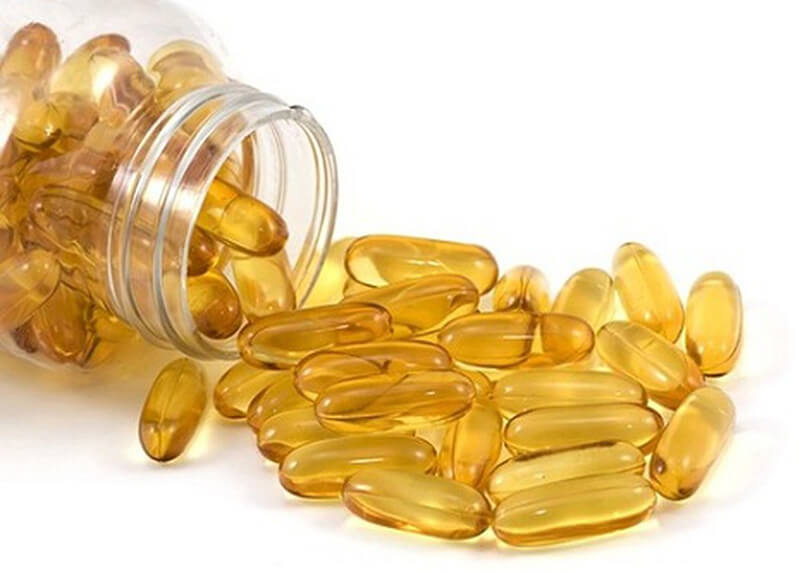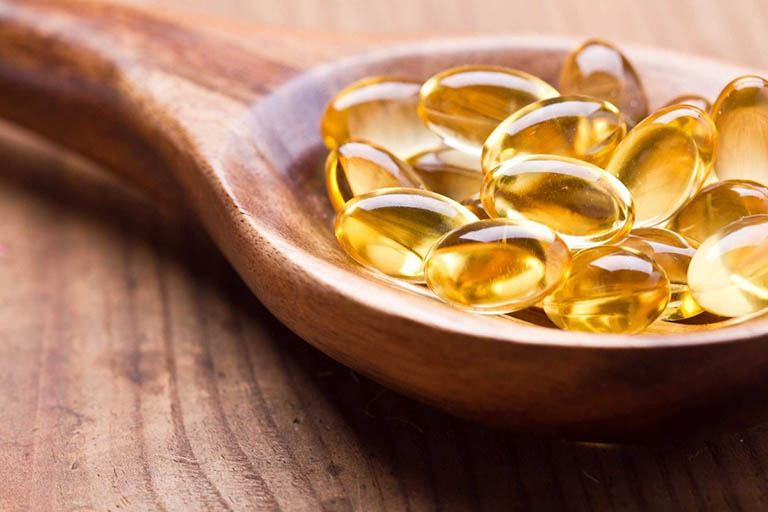Fish oil is a fat-soluble vitamin derived from omega-3-rich fish such as mackerel, tuna, salmon, sturgeon, sardines, anchovies, and herring. To maximize the benefits of fish oil, it is often combined with calcium, iron, or vitamins such as A, B1, B2, B3, C, and D. Let’s explore the benefits of fish oil further in the following article.
1 Benefits of Fish Oil
Cardiovascular Disease Prevention
 Fish oil for heart health
Fish oil for heart health
Cardiovascular disease is a common condition, especially among the elderly. Taking the right amount of fish oil can help lower cholesterol and reduce arterial stiffness, preventing heart rhythm disorders and keeping your heart healthy.
Cancer Prevention
The main component of fish oil is omega-3 fatty acids, which help prevent three common types of cancer: breast, prostate, and colorectal cancer. Omega-3 nourishes healthy cells and inhibits the growth of useless cells.
Weight Loss Support

Australian studies have shown that fish oil contributes effectively to weight loss and reduces the risk of obesity.
Joint Pain Relief
Long-term use of fish oil can help reduce and prevent joint pain, promoting healthier joint function and supporting the treatment of arthritis.
Eye, Hair, and Skin Health
The omega-3 content in fish oil helps protect the eyes, reducing the risk of dry eye syndrome and age-related macular degeneration. It also keeps skin firm and wrinkle-free by stimulating collagen production and promotes healthy, shiny hair.
Mental Health Support
Fish oil supplementation reduces the risk of schizophrenia and Alzheimer’s disease and is beneficial for patients with depression.
Lowering Blood Pressure

Omega-3 in fish oil helps lower blood pressure, prevent blood clots, and reduce inflammation. It also improves blood flow back to the body, reducing pressure on the heart.
Prenatal Benefits
Fish oil contains DHA, which is beneficial for the eyes and brain development of the fetus. When taken in the right amounts, it offers health benefits for both mother and child.
Nail Health
Fish oil is used in beauty treatments as it improves nail quality, making nails stronger and shinier.
Anti-Inflammatory Properties
Fish oil aids in the treatment of digestive disorders, chronic inflammatory diseases, and the prevention of blood and tissue inflammation.
Brain Health
Fish oil improves blood circulation, benefiting the brain by enhancing focus, memory, and cognitive function. It also promotes relaxation and a calm mood.
Reducing Risk of Type 2 Diabetes
Recent studies suggest that fish oil may prevent inflammation in fat cells, one of the causes of type 2 diabetes.
Acne Treatment
Fish oil contains EPA, which is effective in treating acne.
2 Side Effects of Fish Oil
Increased Blood Sugar Levels

Excessive omega-3 fatty acid intake may stimulate glucose production, leading to increased blood sugar levels. Specifically, consuming 8g of omega-3 fatty acids daily can cause a 22% increase in blood sugar levels over an 8-week period in type 2 diabetic patients.
Bleeding
If you experience gum bleeding or nosebleeds, it could be a sign of excessive fish oil intake. Recent studies suggest that high doses of fish oil can inhibit the blood clotting process, leading to easy bruising and bleeding gums.
Low Blood Pressure
While fish oil can help balance high blood pressure when taken in appropriate doses, it can also cause serious health issues for individuals with low blood pressure.
Diarrhea
One of the side effects of fish oil is that it can cause bloating and diarrhea. If you experience diarrhea after taking fish oil, reconsider your dosage and consult a doctor.

Gastrointestinal Issues
High fat content in fish oil can cause acid reflux, leading to belching, nausea, and discomfort.
Vitamin A Toxicity
Some fish oils contain high levels of vitamin A, and excessive consumption can lead to toxicity, causing side effects such as dizziness, nausea, joint pain, and skin irritation. Long-term use may also damage the liver.
Sleep Disturbances
Excessive fish oil intake can interfere with sleep and cause insomnia, especially in children.
3 Recommended Dosage of Fish Oil
According to the European Food Safety Authority, omega-3 fatty acid supplementation is safe at doses up to 5,000mg per day. The World Health Organization recommends that pregnant women take 300mg of EPA and DHA, which are essential forms of omega-3 fatty acids. For infants up to one year old, the recommended omega-3 intake is 500mg, gradually increasing to 1,400mg for adolescents, and for adults, women should consume 1,100mg, and men should consume 1,600mg daily.
In conclusion, while fish oil offers various benefits, it is important to use it at the right time and in the right amounts. Consult your doctor before taking fish oil to ensure you receive the best advice for your health.



































